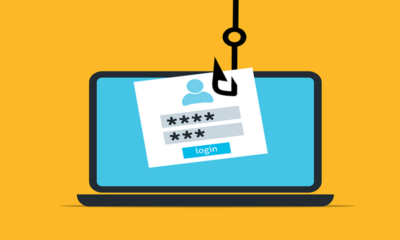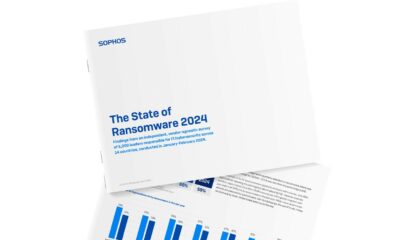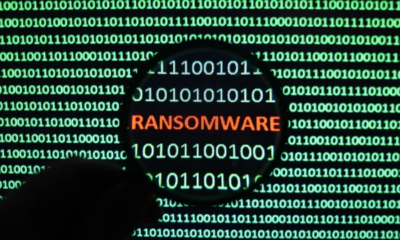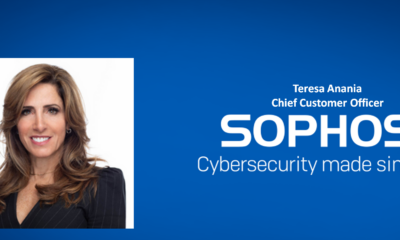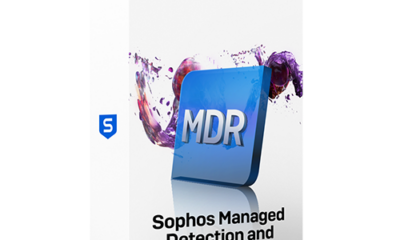News
COVID-19: Sophos shares five tips on how remote workers can stay cybersecured


BY: Sandra Ani
Following the Federal and State Governments directives that businesses in Nigeria should adopt measures to curtail the spread of Coronavirus many if not most organisations have already crossed the “working from home”, or at least the “working while on the road” bridge.
Therefore, the global concerns over the current coronavirus (Covid-19) outbreak, and the need to keep at-risk staff away from the office, means that lots of companies may soon and suddenly end up with lots more staff working from home
A global cybersecurity Company has also suggested that it is vital not to let the precautions intended to protect the physical health of a company staff turn into a threat to their cybersecurity health at the same time.
“Importantly, if you have a colleague who needs to work from home specifically to stay away from the office then you can no longer use the tried-and-tested approach of getting them to come in once to collect their new laptop and phone, and to receive the on-site training that you hope will make them a safer teleworker”, Principal Research Scientist Sophos, Paul Ducklin, said while stressing that organisations are now in need to set remote users up from scratch, entirely remotely, something some have not done a lot of in the past.
Ducklin went ahead to list five tips for working from home safely:
1. Make sure it’s easy for your users to get started:
“Look for security products that offer what’s called an SSP, short for Self-Service Portal. What you are looking for is a service to which a remote user can connect, perhaps with a brand new laptop they ordered themselves, and set it up safely and easily without needing to hand it over to the IT department first.
“Many SSPs also allow the user to choose between different levels of access, so they can safely connect up either a personal device (albeit with less access to fewer company systems than they’d get with a dedicated device), or a device that will be used only for company work.
“The three key things you want to be able to set up easily and correctly are: encryption, protection and patching.
“Encryption means making sure that full-device encryption is turned on and activated, which protects any data on the device if it gets stolen; protection means that you start off with known security software, such as anti-virus, configured in the way you want; and patching means making sure that the user gets as many security updates as possible automatically, so they don’t get forgotten.
“Remember that if you do suffer a data breach, such as a lost laptop, you may well need to disclose the fact to the data protection regulator in your country.
“If you want to be able to claim that you took the right precautions, and thus that the breach can be disregarded, you’ll need to produce evidence – the regulator won’t just take your word for it!
2. Make sure your users can do what they need
“If users genuinely can’t do their job without access to server X or to system Y, then there’s no point in sending them off to work from home without access to X and Y.
“Make sure you have got your chosen remote access solution working reliably first – force it on yourself! – before expecting your users to adopt it.
“If there are any differences between what they might be used to and what they are going to get, explain the difference clearly – for example, if the emails they receive on their phone will be stripped of attachments, don’t leave them to find that out on their own.
“They’ll not only be annoyed, but will probably also try to make up their own tricks for bypassing the problem, such as asking colleagues to upload the files to private accounts instead.
“If you’re the user, try to be understanding if there are things you used to be able do in the office that you have to manage without at home.
3. Make sure you can see what your users are doing
“Don’t just leave your users to their own devices (literally or figuratively). If you’ve set up automatic updating for them, make sure you also have a way to check that it’s working, and be prepared to spend time online helping them fix things if they go wrong.
“If their security software produces warnings that you know they will have seen, make sure you review those warnings too, and let your users know what they mean and what you expect them to do about any issues that may arise.
“Don’t patronise your users, because no one likes that; but don’t leave them to fend for themselves, either – show them a bit of cybersecurity love and you are very likely to find that they repay it.
4. Make sure they have somewhere to report security issues
“If you haven’t already, set up an easily remembered email address, such as security911 @ yourcompany DOT example, where users can report security issues quickly and easily.
“Remember that a lot of cyberattacks succeed because the crooks try over and over again until one user makes an innocent mistake – so if the first person to see a new threat has somewhere to report it where they know they won’t be judged or criticised (or, worse still, ignored), they’ll end up helping everyone else.
“Teach your users – in fact, this goes for office-based staff as well as teleworkers – only to reach out to you for cybersecurity assistance by using the email address or phone number you gave them. (Consider snail-mailing them a card or a sticker with the details printed on it.)
“If they never make contact using links or phone numbers supplied by email, they they are very much less likely to get scammed or phished.
5. Make sure you know about “shadow IT” solutions
Shadow IT is where non-IT staff find their own ways of solving technical problems, for convenience or speed.
“If you have a bunch of colleagues who are used to working together in the office, but who end up flung apart and unable to meet up, it’s quite likely that they might come up with their own ways of collaborating online – using tools they’ve never tried before.
“Sometimes, you might even be happy for them to do this, if it’s a cheap and happy way of boosting team dynamics.
For example, they might open an account with an online whiteboarding service – perhaps even one you trust perfectly well – on their own credit card and plan to claim it back later.
“The first risk everyone thinks about in cases like this is, “What if they make a security blunder or leak data they shouldn’t?”
“But there’s another problem that lots of companies forget about, namely: what if, instead of being a security disaster, it’s a conspicuous success?
“A temporary solution put in place to deal with a public health issue might turn into a vibrant and important part of the company’s online presence.
“So, make sure you know whose credit card it’s charged to, and make sure you can get access to the account if the person who originally created it forgets the password, or cancels their card.
“So-called “shadow IT” isn’t just a risk if it goes wrong – it can turn into a complicated liability if it goes right!
Most of all, the Paul Ducklin added, “if you and your users suddenly need to get into teleworking, be prepared to meet each other half way.
“For example, if you’re the user, and your IT team suddenly insists that you start using a password manager and 2FA (those second-factor login codes you have to type in every time)…
“…then just say “Sure,” even if you hate 2FA and have avoided it in your personal life because you find it inconvenient.
“And if you’re the sysadmin, don’t ignore your users, even if they ask questions you think they should know the answer to by now, or if they ask for something you’ve already said “No” to…
“…because it might very well be that they’re asking because you didn’t explain clearly the first time, or because the feature they need really is important to doing their job properly.
“We’re living in tricky times, so try not to let matters of public health cause the sort of friction that gets in the way of doing cybersecurity properly!
Here are other Sophos resources related to COVID-19 that you may find useful:
SophosLabs has uncovered a variety of different malicious email campaigns connected to COVID-19, including:
Phishing scams impersonating the WHO, CDC, and other healthcare organizations to deliver malware via malicious documents disguised as official information on how to stay safe during the pandemic
Cybercriminals impersonating charities and relief organizations like the WHO’s COVID-19 Solidarity Response Fund to trick victims into sending them Bitcoin
SophosLabs is updating its Uncut blog with new findings in real time.
News
‘If You Want It Dirty, You’ll Get It Dirty’, Benue Diaspora DG Escalates Threat Against National Record Reporter
By Our Reporter


The Editor-in-Chief of National Record, Iduh L. Onah, has raised alarm over what he described as ‘grave threats’ issued against one of the online newspaper’s reporters, Mr. Amos Aar, by the Director-General of the Benue State Directorate of Diaspora Linkages and Investments, Professor Abraham Tartenger Girgih.
In a letter dated June 25, 2025, addressed to Prof. Girgih and made available to the press, National Record condemned what it called “unwarranted threats” following the publication of a report on the funding challenges being faced by the Directorate under the DG’s leadership since its formation in 2024.
According to Onah, while the publication welcomes robust engagement in the form of rejoinders on stories perceived to contain among other things misinformation, misrepresentation or distortion, no one has the right to issue threats.
“While it is within your right to respond to perceived misinformation or misrepresentation and distortion or outright fabrication, in any publication, it is, however, beyond that right to issue a threat as grave as “dire consequences”, Onah stated.
The Editor-in-Chief further noted that the situation escalated after the publication of a follow-up report when Prof. Girgih called the correspondent and made what the paper considers to be a further threat.
“After the publication of the threat and other claims in your rejoinder, you again went ahead to issue what we deemed to be further grave threat when you stated: “…if you want it dirty, you will get it dirty”, among other words perceived as veiled threat, in a telephone conversation you had with our correspondent shortly after you may have read our follow-up report,” stated the Editor-in-Chief.
The management of National Record expressed deep concern for the safety of its correspondent and other staff, especially given the hostile tone of Prof. Girgih in his conversation with the reporter.
The media organization said it is taking steps to notify security agencies, the Benue State Government, and professional journalism bodies about the threats, while also demanding a written assurance from Prof. Girgih that no harm will befall Mr. Aar or any member of the newspaper’s staff.
“We demand from you a written assurance of Mr Aar’s safety from harm and that of our other staff, and a further commitment to desist from harassing, heckling, intimidating or bullying us in whatever manner,” Onah wrote.
While no official response had been received from Prof. Girgih as at press time, National Record expressed hope for civility going forward and reiterated its commitment to its constitutional mandate as a stakeholder in the Fourth Estate of the Realm.
The letter reads in full:
Professor Abaham Tartenger Girgih
The Director-General
Directorate of Diaspora Linkages and investments
Makurdi, Benue State.
Dear Prof. Girgih;
THREATS ON OUR PERSONNEL AND ORGANISATION
On behalf of the Management of Contest Communications Limited, publishers of National Record, I bring you warm fraternal greetings.
We wish to express our dismay and concern over your threat on our Benue State Correspondent, Mr Amos Aar, in particular, and generally, our entire organisation, as contained in your rejoinder to a report we had published on challenges being faced by the agency which you head.
While it is within your right to respond to perceived misinformation or misrepresentation and distortion or outright fabrication, in any publication, it is, however, beyond that right to issue a threat as grave as “dire consequences”.
After the publication of the threat and other claims in your rejoinder, you again went ahead to issue what we deemed to be further grave threat when you stated: “…if you want it dirty, you will get it dirty”, among other words perceived as veiled threat, in a telephone conversation you had with our correspondent shortly after you may have read our follow-up report.
While we intend to take steps to formally note these threats before the appropriate security agencies, the Benue State Government under which you are serving, as well as our professional organisations nationally; we wish to inform you that the life of our Benue State Correspondent, Amos Aar, and our entire personnel, remains insecure in the context of your threats.
In that regard, we demand from you a written assurance of Mr Aar’s safety from harm and that of our other staff, and a further commitment to desist from harassing, heckling, intimidating or bullying us in whatever manner from carrying out our constitutional mandate as key stakeholders in the Fourth Estate of the Realm.
As we look forward to relating with you in formal, civilised manner, and prompt action on our demands, please, accept the assurances of our esteemed regards.
Iduh L. Onah
Editor-in-Chief
National Record (https://nationalrecord.com.ng)
News
Gov Mbah Inaugurates Committee to End Gender-Based Violence in Enugu


The Enugu State government has inaugurated a steering committee to eliminate Gender-Based Violence, GBV, in the state, declaring zero tolerance for the social malaise.
The inauguration took place at the Government House Enugu.
The panel, which is chaired by the Commissioner for Children, Gender Affairs and Social Development, Mrs. Ngozi Enih, draws its membership from the Nigeria Police Force, Ministry of Agriculture and Agro Industrialisation, Ministry of Local Government, Rural Development and Chieftaincy Affairs, Ministry of Human Development and Poverty Reduction, Ministry of Trade, Investment and Industry, Ministry of Justice, Ministry of Health, Ministry of Education as well as the Civil Society.
Inaugurating the panel known as the Steering Committee for Strengthening Institutional and Community Responses to End Gender-Based Violence/Domestication of Enugu State Gender Policy using the Oputa Panel approach, Governor Peter Mbah restated his administration’s commitment to not bringing perpetrators of GBV to book, but also putting in place proactive measures – activities, infrastructure, and systems in place to prevent them.
Mbah, who was represented by the Secretary to the State Government, Prof. Chidiebere Onyia, said, “We take gender-based violence seriously. We have zero tolerance for it, and in Enugu State, we are ready to go the extra mile to deal with it.
“If you notice, the government has selected people that are very committed to this goal. This is not an activity where we just want to check-off the list. We will track this. We will monitor this, and we will have quarterly engagements on the successes that this particular committee has achieved in terms of reference that we are going to send.
“We will tighten those terms of reference indicators, so that we monitor what we are doing both in terms of cost input and the value added. It’s very important to us. Many people will be involved – civil society, the police and various ministries.”
He however, said that the effort was to protect everyone, men and women alike, as GBV was not restricted to any gender.
“The whole idea is to hold people responsible that are involved in matters relating to gender violence and deter people that by culture or by association get involved in that, protect women, protect our children, and in the case of violence against men, protect our men because most times we misconstrue gender violence to mean women, but it can also be men too.
“We encourage our men to speak out and to make sure they understand that the policy that Enugu State is soon going to domesticate is for everyone, and not only for the female gender,” he stated.
In her remark, Mrs. Enih, explained that the Oputa Panel approach was inspired by the need to cover all local peculiarities in domesticating the policy on GBV, restarting government’s confidence in the members of the panel.
“The approach we are going to use is the Oputa Panel approach, and in the Oputa Panel approach, we are going to tour the 17 Local Government Areas to get firsthand information about what our people are going through because policy is meant for the people, and a policy should suit the people.
“Again, every community has its peculiar problems, so that’s why the government decided that if we have to domesticate the gender policy, we have to hear from the people who own the policy and know the changes that they desire to see. That is the reason we are using this approach.
“The committee members are to also serve as judges. As we gather this information from our people, we will come back to tailor it in a way to suit the people of Enugu State, and then our policy is ready.
“We want the people to know that there is a gender policy for them. I can assure you that when the people are aware that there is such a policy, they will seek for the enforcement of that policy. So, this is not going to be one of those policies that will just lie on the shelf,” she said.


Digital solutions provider, Globacom, has congratulated Christians in Nigeria on this year’s Easter celebration, and urged them to emulate the noble qualities of Jesus Christ.
The company, in a goodwill message to the Christian faithful in the country, lauded their perseverance through the Lenten period which preceded Easter. It enjoined them to always promote the ideals of selflessness, love and peace among all as a way of demonstrating the virtues of the exemplary life of Jesus Christ.
“Peace, love and sacrifice are the central message of Easter. Christ offered himself in atonement for the sins of the world and he lived a life which made Him an eternal symbol of peace and goodwill for mankind”, Globacom added.
The company enjoined all Nigerians to share in the lessons of promoting selflessness, a necessary ingredient in the growth and development of every society. It also enjoined all Nigerians to join hands to make Nigeria a better place for all.
Easter is celebrated yearly at the end of the Lenten season of fasting and prayer considered as a ritual of purification for the Christian faithful. It also precedes the crucifixion of the Lord Jesus Christ on Good Friday and His eventual resurrection on Easter Sunday.
The company assured its customers of seamless voice, data and Short Messaging Service (SMS) during and after the Easter celebrations, while urging them to avail themselves of the various data and voice offerings on the network.

